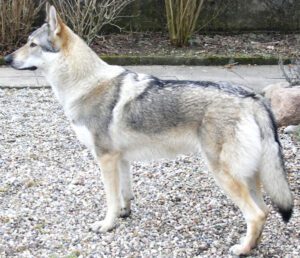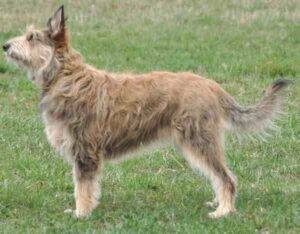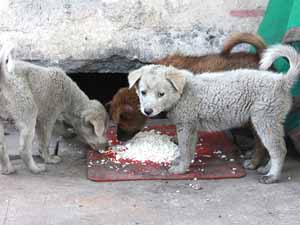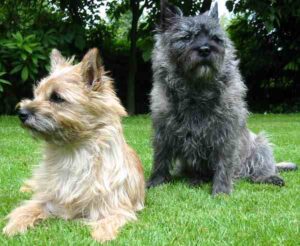The Bernese Mountain dog is a large and very beautiful breed of dog. It is one of the 4 breeds of Sennenhund-type dogs from the Swiss Alps. It is also known by some other names such as Berner Sennenhund and Bernese Cattle Dog.
The Bernese Mountain dogs were bred from crosses of Mastiffs and guard-type breeds. They were brought to Switzerland by the Romans about 2,000 years ago. The name Sennenhund is derived from the German Senne (“alpine pasture”) and Hund (hound/dog), as they accompanied the alpine herders and dairymen called Senn.
Berner (Bernese in English) refers to the area of the breed’s origin, in the canton of Bern. The Bernese Mountain dogs were originally kept as a general farm dog.
In the past, the large Sennenhund were also used as draft animals, pulling carts. And the breed was officially established in 1907. The American Kennel Club (AKC) recognized the breed in 1937. Today, AKC classifies the breed as a member of the Working Group.[1]
Bernese Mountain Dog Characteristics
The Bernese Mountain dogs are very beautiful and large in size. It is considered a dry-mouthed breed. The breed is slightly longer than it is tall. They are highly muscular, with a strong and wide back.
The head of the Bernese Mountain dog is flat on the top with a moderate stop, and the ears are medium-sized, triangular, set high and rounded at the top.
Teeth of the Bernese Mountain dogs have a scissors bite. Their legs are straight and strong, with round and arched toes. The dewclaws of these dogs are often removed. And it’s bushy tail is carried low.
Average body height of the mature dogs is between 23 and 26 inches at the withers for females, and between 25 and 27.5 inches for the males. Average live body weight of the mature dogs is between 45 and 75 kg for males, and between 40 and 65 kg for the females.
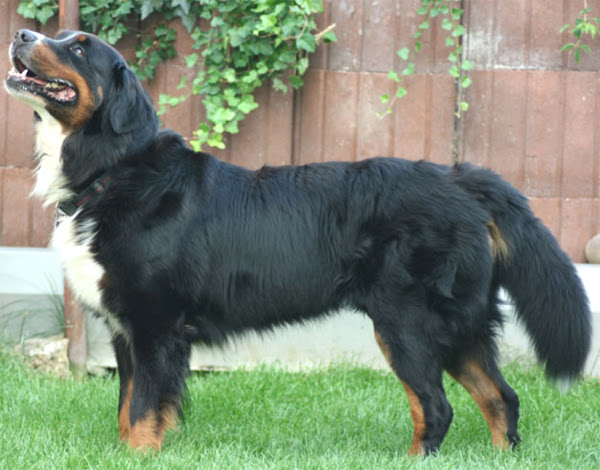
Temperament
The Bernese Mountain dogs are good-natured, self-assured, placid towards strangers and docile. They only attacks if really needed (if their owners getting attacked). Although, the temperament of the individual dogs may vary, and not all examples of the breed have been bred carefully to follow the standard.
Like many other large dog breeds, the Bernese Mountain dogs should be well socialized when they are puppies, and given regular training and activities throughout their lives.
The Bernese Mountain dogs are outdoor dogs at heart. Although, they are well-behaved in the house. They need activity and exercise, but do not have a great deal of endurance. They can move with amazing bursts of speed for their size when motivated. If they are sound, they enjoy hiking and generally stick close to their people. Barking and harassing may happen if adequate amount of exercise is given per day.
The Bernese Mountain dogs generally do well with children, as they are very affectionate. They are patient dogs that take well to children climbing over them. They also work well with other pets and around strangers.
They are excellent guardians. They tend to bond with one owner or family, and are somewhat aloof and standoffish towards strangers.
Lifespan
Average lifespan of the Bernese Mountain dog is between 7 and 8 years.
Feeding
How much a mature dog eats depends on it’s size, age, build, metabolism and activity level. Dogs are individuals, just like people, and they don’t all need the same amount of food.
The Bernese Mountain dogs are large in size. So, their diet should be formulated for a large-sized breed with average to high exercise needs. You can consult with a vet in your area for better recommendation.
Caring
Taking good care of the animals is very important for raising Bernese Mountain dogs. They are very active dogs and are not suited to the apartment or condo life. A home with a large, securely fenced yard is best choice for them.
The Bernese Mountain dogs have plenty of energy, as they are working dogs. They need a minimum of 30 minutes of vigorous exercise daily, in addition to yard play.
The Bernese Mountain dogs are a natural fit for the cold climates, as they have thick and handsome coat. Conversely, with his black coat and large size, they’re prone to heat stroke. Don’t allow them to exercise strenuously when it’s extremely hot; limit exercise to early mornings or evenings, when it’s cooler. Keep them cool during the heat of the day, either inside with fans or air-conditioning or outside in the shade.
The Bernese Mountain puppies require special care. They grow rapidly between the ages of 4 and 7 months, like many other large dog breeds (making them susceptible to bone disorders and injury). The puppies generally do well on a high quality, and low calorie diet that keeps them from growing too fast.
Health
The Bernese Mountain dogs are generally healthy. But like all other dog breeds, they are also prone to certain health conditions.
Their common health problems include hip dysplasia, elbow dysplasia, hypothyroidism, and von Willebrand’s disease. Always try to keep good contact with a vet in your area.
| Breed Name | Bernese Mountain Dog |
| Other Names | Berner Sennenhund and Bernese Cattle Dog |
| Breed Size | Large |
| Height | Between 23 and 26 inches at the withers for females, and between 25 and 27.5 inches for the males |
| Weight | Between 45 and 75 kg for males, and between 40 and 65 kg for the females |
| Good as pets | Yes |
| Climate Tolerance | All climates |
| Color | Tricolor (black, rust and white) |
| Lifespan | Between 7 and 8 years |
| Good for children | Yes |
| Rarity | Common |
| Country of Origin | Switzerland |

